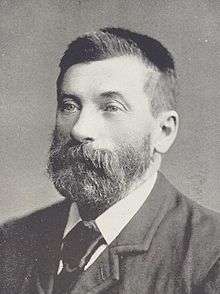William Archibald
| The Honourable William Archibald | |
|---|---|
 | |
| Member of the Australian Parliament for Hindmarsh | |
|
In office 13 April 1910 – 13 December 1919 | |
| Preceded by | James Hutchison |
| Succeeded by | Norman Makin |
| Personal details | |
| Born |
3 June 1850 St Pancras, London, England |
| Died |
28 June 1926 (aged 76) Adelaide, South Australia |
| Nationality | Australian |
| Political party |
Labor (1893–17) Nationalist (1917–19) |
| Spouse(s) |
1) Rose Owens 2) Elizabeth Pollard 3) Marie Schmett |
| Occupation | Various |
- See also William Archibald (disambiguation) for other people with similar names.
William Oliver Archibald (3 June 1850 – 28 June 1926) was an Australian politician. He was a member of the South Australian House of Assembly from 1893 to 1910, representing Port Adelaide, and a member of the Australian House of Representatives from 1910 to 1919, representing Hindmarsh. Archibald was a Labor member until resigning in the 1916 Labor split; he subsequently served as a Nationalist until his defeat at the 1919 federal election.
Early life
Born in St Pancras, London, Archibald was orphaned at 10 and educated to primary school level in England, then worked as an apprentice piano builder before emigrating first to New Zealand in 1879 and thence to New South Wales and Victoria in 1881 before arriving in South Australia in 1882.
Archibald was initially employed on the Port Adelaide wharves before working for the South Australian Government Railway workshop, where he was elected to the executive council of the Railway Services Mutual Association.
Political career
A foundation member of the United Labor Party (the predecessor of the Australian Labor Party), Archibald gained pre-selection for the South Australian House of Assembly Electoral district of Port Adelaide and was comfortably elected at the 1893 election.
Archibald rose to prominence in parliament and gained a reputation as a "hard-working member who always thoroughly mastered his subject". He also successfully introduced a number of important bills into parliament, including legislation on social issues like the establishment of public libraries, worker's compensation and rent relief. Archibald also found time to serve as President of the South Australian branch of the Labor Party from 1901–02 and Caucus chairman from 1905-08.
Archibald retired from state parliament in 1910 in order to stand as the Labor candidate for the safe federal seat of Hindmarsh at the 1910 federal election. He was elected unopposed.
After travelling to England as an official Australian parliament representative to the coronation of King George V in 1911, Archibald was re-elected in 1913 and 1914 and appointed Minister for Home Affairs by Prime Minister Andrew Fisher.
In 1916, an internal party row over conscription led to a split in the ALP and Archibald, along with Prime Minister and Labor leader Billy Hughes, left the ALP to form the National Labor Party. For his support, Hughes appointed Archibald Minister for Trade and Customs in the short lived Second Hughes Ministry. Archibald followed Hughes into the Nationalist Party of Australia later in 1917. He narrowly won reelection as a Nationalist in the election held later that year. However, Hindmarsh was naturally a Labor seat, and he was defeated by Labor's Norman Makin in the 1919 general election.
Late life
The thrice married Archibald worked as a book-seller in Semaphore until his retirement and died in Adelaide in 1926. He was survived by his third wife and a son and daughter from his first marriage.
References
- Jaensch, Dean; Martha Rutledge (1979), "Archibald, William Oliver (1850 - 1926)", Australian Dictionary of Biography, Australian National University, Melbourne University Press, 7, retrieved 2007-05-14
| Political offices | ||
|---|---|---|
| Preceded by Joseph Cook |
Minister for Home Affairs 1914 – 1915 |
Succeeded by King O'Malley |
| Preceded by Billy Hughes |
Minister for Trade and Customs 1916 – 1917 |
Succeeded by Jens Jensen |
| Parliament of Australia | ||
| Preceded by James Hutchison |
Member for Hindmarsh 1910 – 1919 |
Succeeded by Norman Makin |